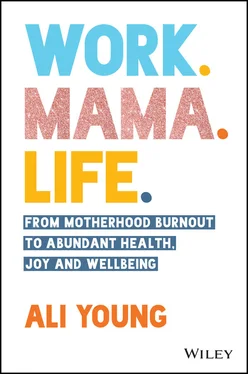Ali Young - Work. Mama. Life.
Здесь есть возможность читать онлайн «Ali Young - Work. Mama. Life.» — ознакомительный отрывок электронной книги совершенно бесплатно, а после прочтения отрывка купить полную версию. В некоторых случаях можно слушать аудио, скачать через торрент в формате fb2 и присутствует краткое содержание. Жанр: unrecognised, на английском языке. Описание произведения, (предисловие) а так же отзывы посетителей доступны на портале библиотеки ЛибКат.
- Название:Work. Mama. Life.
- Автор:
- Жанр:
- Год:неизвестен
- ISBN:нет данных
- Рейтинг книги:4 / 5. Голосов: 1
-
Избранное:Добавить в избранное
- Отзывы:
-
Ваша оценка:
- 80
- 1
- 2
- 3
- 4
- 5
Work. Mama. Life.: краткое содержание, описание и аннотация
Предлагаем к чтению аннотацию, описание, краткое содержание или предисловие (зависит от того, что написал сам автор книги «Work. Mama. Life.»). Если вы не нашли необходимую информацию о книге — напишите в комментариях, мы постараемся отыскать её.
Work. Mama. Life.
Work. Mama. Life,
Work. Mama. Life
Work. Mama. Life.
Work. Mama. Life. — читать онлайн ознакомительный отрывок
Ниже представлен текст книги, разбитый по страницам. Система сохранения места последней прочитанной страницы, позволяет с удобством читать онлайн бесплатно книгу «Work. Mama. Life.», без необходимости каждый раз заново искать на чём Вы остановились. Поставьте закладку, и сможете в любой момент перейти на страницу, на которой закончили чтение.
Интервал:
Закладка:
I also felt extreme joy and gratitude that there was this little person hanging out with me all day. I mean, she was cute and stuff. She did poo, wee, she boobed, she slept occasionally. Joy!
I craved the joy and the togetherness with her … and yet there was a niggle in the back of my mind. I felt a niggle to begin to look a certain way, to exercise, to not get too upset, to be in control, to never feel guilty or burned out or tired, to have my child ‘behave’ in a certain way. My perception was that my mothering was predicated by how well she did certain things.
This chapter is probably a little heavy on the concepts of society and motherhood. But remember that part Iof the book is giving you the background to step into your awesome health and vitality with all the knowledge you need.
In this chapter we are going to explore:
our inner critic as a mother — you know, that mean girl inside our mind!
intergenerational motherhood: how the way we were mothered impacts our mothering
the five common societal expectations of motherhood
a quick expectation shake-off method.
Commonly, we poor mums have a lot of questions shoved in our general direction. I mean, really, do we want to judge our mothering on things that we have minimal control over?
Is she sleeping well?
Are you getting enough sleep?
Have you read this book or that book?
Are you following what this person has told you?
Are they the right expert to be following?
Are they the ones who are going to give you the best information?
Feeling all the expectations to wade through the information out there and derive the most knowledge out of the available resources and then put it to good use was a thing (a thing that I very much didn't enjoy!). As a professional woman, and particularly one in the health sector, I was supposed to do this better than the woman who didn't fit into this demographic of mother.
As a health professional who worked with babies and mums for a living, I felt that I couldn't ever fail. Failure meant, in my mind, that I was not a good health professional. The mothering I was doing was commentary on my ‘fitness’ to be a health professional. The internal judging if I felt I wasn't doing a great job. And when I chose to go back to work, how could anybody trust me again because I clearly sucked at this motherhood gig when it came to living it myself. So let's dive into how I fell into the society trap, and how I can help you get out of it a little easier using some simple steps.
Our inner critic: that mean girl mum living inside of us
Have you ever watched the movie Mean Girls ? I love that film. I mean, of course I was not a mean girl. At least not to others … but most definitely to myself at times.
Now, as a mama, I recognise a little bit of mean girl lives in my brain. You know, that mean girl telling you that you should have done something a different way. You should have:
had a different conversation about disappointment with your child
taken time off to go to the swimming carnival at school
not taken time off to go to the swimming carnival coz, you know, profit and loss statements are a thing to consider
not booked that massage
gone for a run — fatty!
not gone for a run — kid time is more important.
That bloody mean girl has a lot to answer for, right?
Your narrative is probably quite different from mine. I mean, our mean girls take on a whole different voice for ourselves. Maybe your inner critic said differing things to you. But the one thing that drives all of our inner critics are expectations .
In the previous chapter we explored some of the elements that drive our mothering experience. In this chapter, let's have a look at these expectations as they play out in the motherhood world, with a lens specifically focused on us as mothers.
Before we step into this in the motherhood sphere, having a basic understanding of the psychology of the inner critic (mean girl), inner voice (awesome girl) and expectations (noisy world) provides a great basis for the understanding of how this fits in. In a comprehensively researched article on the website Positive Psychology, professor of cultural history at the University of Kent, Anna Katharina Schaffner writes about living with our inner critic. I love how she has condensed our understanding of this into automatic negative thoughts (ANTs), also commonly called negative self-talk. I just like to call it my mean girl! Go to the resources at the back of this book for info on her article.
Our mean girl is established in our childhood, and she basically materialises when we begin to look at common things in our environment through the lens of ‘the way we should do things’. This means she creates ideal scenarios in our mind of things we should do and say — things that may be beyond our capability at the time so we tend to fall short. This mean girl voice is there to act as a bit of a protector in our brain function. Seems weird, I know, but basically, if this voice perceives danger, which is something outside of ‘the way we should do things’, she fires off our fright/flight responses.
This mean girl exists as a psychological protective mechanism to give us a sense of what is occurring in our environment, to allow this fright/flight response to function well. According to Schaffner, it can show up internally if, when we were children, we felt unloved or constantly criticised and we blamed ourselves rather than our parents (total mean girl moment), creating a survival mechanism to dampen this reflex.
Schaffner says the best way to get rid of those recurrent mean girl moments is to change your narrative. This just means, when you hear yourself criticising the things you are doing, do these three things:
1 Recognise that it's a mean girl moment. Feel the response in your body when it's there.
2 Think about what you would rather say to yourself (imagine you are your best mate).
3 Rinse and repeat. One sure way to get rid of that mean girl voice is to constantly shut her up and change what she says.
How does this play out in a real-world setting? Let's look at it simply in mum terms. Imagine that your babe can't string those ‘important’ sleep cycles together. So they are only sleeping for 20- to 40-minute windows. That's a mean girl mum fail right there.
What that mean girl voice is doing, is increasing your stress response by making you constantly feel like you've failed. Over time, that ramps up your stress load and can create a more stressful mothering experience.
No thanks. I don't see that for you. I lived it for me. It ain't great.
Let's kick our mean girls to the curb!
The expectations and stories that are peddled in society as the norm are driving an alteration in our mean girl inner critic, and they can stop us from exploring the realities of what motherhood and our expectations of it truly are.
The mothering conundrum of expectation I feel is twofold. But before I jump into that, let's take a moment to pause together.
II PAUSE MOMENT
Who's your mean girl in your head? Is she a Heather? A Courtney? Is she a Disney Princess turned bad? Or just you, in a different form?
Is there something she keeps saying that you know isn't true?
What do you wish came out of your mean girl's mouth?
Intergenerational mothering: how our mothering is passed along
Expectations can play a large part in mothering. We've kind of established that now. It would be remiss of me to not have a chat about how the generations of mothering that we observe impact how we mother. According to the Center on the Developing Child at Harvard University, our brain lays down the majority of its circuits and pathways in the first few years of life (up until six to seven years of age). My theory is that we learn how to mother from how we are mothered in those first few years. I mean, have you ever listened to yourself and thought, Holy shit — I sound exactly like my mum!
Читать дальшеИнтервал:
Закладка:
Похожие книги на «Work. Mama. Life.»
Представляем Вашему вниманию похожие книги на «Work. Mama. Life.» списком для выбора. Мы отобрали схожую по названию и смыслу литературу в надежде предоставить читателям больше вариантов отыскать новые, интересные, ещё непрочитанные произведения.
Обсуждение, отзывы о книге «Work. Mama. Life.» и просто собственные мнения читателей. Оставьте ваши комментарии, напишите, что Вы думаете о произведении, его смысле или главных героях. Укажите что конкретно понравилось, а что нет, и почему Вы так считаете.












